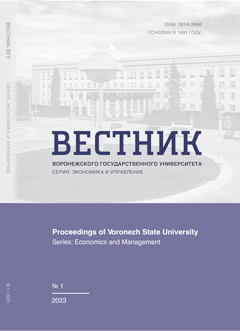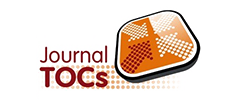Коммуникативный капитал и развитие маркетинга отношений
Аннотация
Предмет. Современное развитие бизнеса в условиях быстрых измене-ний на рынках, применения сквозных цифровых технологий требует нового подхода в отношениях с потребителями и клиентами, новых способов ком-муникаций с ними. Это актуализирует изучение ресурсов, необходимых для обеспечения эффективного процесса организации отношений, формирования коммуникативного капитала.
Цели. Концептуализация категории «коммуникативный капитал», определение его основных свойств и функций, структурных элементов, стадий формирования, роли в развитии долгосрочных отношений с потребителями в современных условиях.
Методология. Использовались системный и институциональный методы исследования. Предложен подход для анализа коммуникативного капитала как нематериального актива, являющегося частью интеллектуального капитала.
Выводы. В ходе исследования было сформулировано авторское определение сущности категории «коммуникативный капитал», раскрыты его свойства и функции, дана характеристика стадий формирования коммуникативного капитала, создания и применения коммуникативных продуктов, выявлены взаимосвязи с человеческим и интеллектуальным капиталом. Предложенный подход может быть использован фирмами для формирования стратегии маркетинга, нацеленной на долгосрочные эффективные отношения с потребителями, выбор наиболее подходящих средств реализации маркетинга лояльности.
Литература
Aaker, D. (2003) Creating strong brands. M.: Grebennikov Publishing House.
Dvoryashina, M.M. (2017) Development of a strategy for managing client assets of the company. Manager. 1(65). 29-33.
Dekalov, V.V. (2017) Communicative capital: conceptualization of the concept // Bulletin of St. Petersburg State University. Sociology. 10(4). 397-409. DOI: 10.21638/11701/spbu12.2017.
The communicative capital of the digital age: materials of the International scientific online conference with international participation. (2021). Moscow: MAX Press.
Cohen, J. A. (2012) Intangible assets. Evaluation and economic benefit. Moscow: Laboratory Books. Access mod
Maksimov, A.A. (2021) Information society as a growth factor of the communicative capital of a modern organization. Communicative capital of the digital era: materials of an International scientific online conference with interna-tional participation. - Moscow: MAKS Press. 101-112.
Melentyeva, N.I. (2007) Communicative capital and interaction marketing in the modern economy. Proceedings of the St. Petersburg State University of Economics. 1. 56-70.
Prosvirina, I.I., Ivanov, A.E., Ostapenko, G.F., Shirshikova, L.A. (2018) Comparative analysis of the dynamics of investments of Russian enterprises in in-tellectual and fixed capital // Economic analysis: theory and practice. 17(1). 131-148.
Skobeleva, I.P., Legostaeva, N.V. (2017) Transformation of the financial architecture of integrated business in a crisis // Influence of science on innovative development: collection of articles of the International Scientific and practical Conference, Yekaterinburg). - Ufa: Moscow OMEGA SCIENCES. 127-130.
Fomicheva, I.D. (2017) Media capital and its composition. Mediascope. 2.
Hanushek, E., Wessmann, L. (2022) Intellectual capital in different coun-tries of the world. Education and economic theory of growth. Moscow: Publishing House of the Higher School of Economics.
Edvinson, L. (2005) Corporative longitude. Navigation in the knowledge–based economy. Moscow : INFRA-M.
Blattberg, R., Deighton, J. (1996) Manage Marketing by the Customer Equity Test. Harvard Business Review. 74 (July–August). 136–144.
Blattberg, R., Getz, G., Thomas, J. (2001) Customer equity: Building and managing relationships as valuable. Boston, MA: Harvard Business School Press.
Dean, J. (2010) Blog Theory. Cambridge, Malden, Polity Press.
Dean, J. (2005) Communicative Capitalism: Circulation and the Fore-closure of Politics // Cultural Politics. 1(1). 51–74.
Jeffres, L., Jian, G., Yoon, S. (2013) Conceptualiz-ing Communication Capital for a Changing Environment // Communica-tion quarterly. 61(5). 539-563.
Gupta, S., Lehmann, D. Customers as Assets (2003) Journal of Interac-tive Marketing 17, no. 1 (winter 2002): 9–24. (Winner of Journal of Interactive Marketing. Best Paper Award.) Journal of Interactive Marketing 17(1):9 – 24. DOI: 10.1002/dir.10045.
Kolbe L. M., Österle, H., Brenner, W. (2003) Customer Knowledge Management: Kundenwissen erfolgreich einsetzen Springer Berlin Heidelberg.
Malmelin, N. (2007) Communication capital: Modelling corporate communications as an organizational asset. Corporate Communications: An Inter-national Journal. 12 (3). 298-310. DOI: 10.1108/13563280710776888.
Palmatier, R., Steinhoff L. (2019) Relationship marketing in the digital age. London : Routledge. DOI: 10.4324/9781315143583
Persson, A., Ryals, L. (2010) Customer assets and customer equity: Management and measurement issues // Marketing Theory. 10(4). 417-436. DOI: 10.1177/1470593110382828.
Rust, R. T., Lemon, K., Zeithaml, V. (2004) Return on marketing: Us-ing customer equity to focus marketing strategy. Journal of Marketing 68, 109-127.

Это произведение доступно по лицензии Creative Commons «Attribution» («Атрибуция») 4.0 Всемирная.























